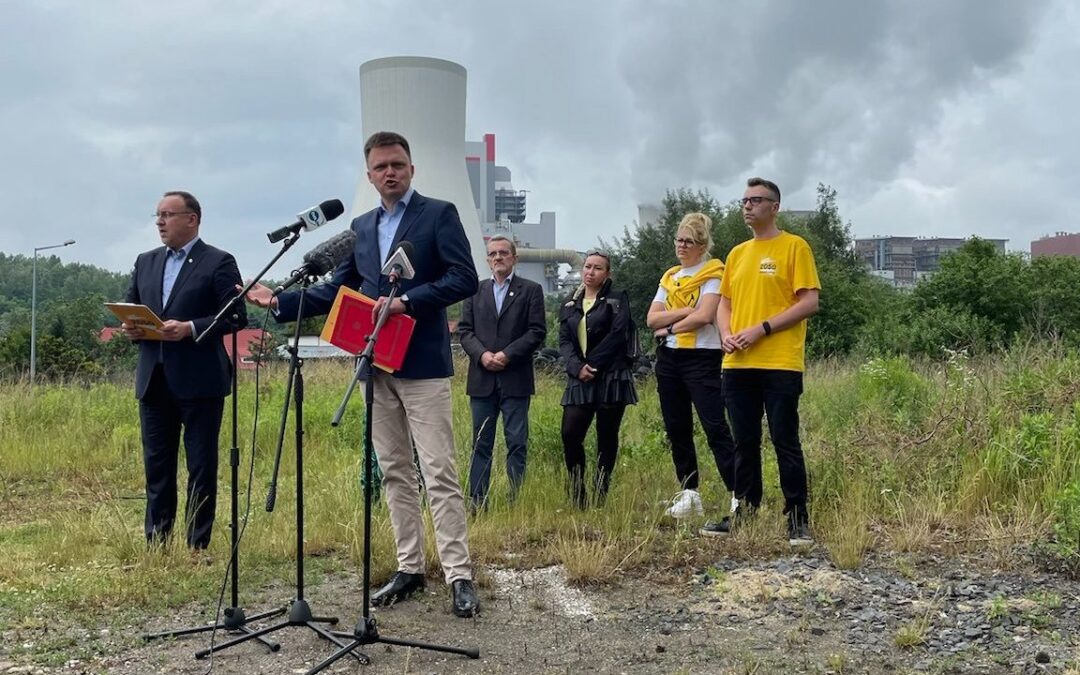A leading opposition party has proposed introducing a guaranteed minimum income. After the proposal set off a storm of commentary from liberal and right-wing figures, the party’s leader clarified that the proposal related only to employees of the coal industry, as Poland seeks to move away from the fossil fuel.
The idea was put forward by Poland 2050 (Polska 2050), a centrist party founded by independent presidential candidate Szymon Hołownia and which is currently the most popular opposition group in polls.
A guaranteed income at the minimum wage level – currently 2,800 zloty (€620) per month – “paid until retirement age” should be “very seriously considered”, said the party’s chairman, Michał Kobosko, at an announcement on Saturday in front of a coal-fired power station.
“On the one hand, such a guaranteed income would provide money for survival; on the other, it would encourage people to look for additional job opportunities and find a [better] salary,” he said.
The idea was quickly met with criticism, however. Leszek Balcerowicz – who as finance minister in the 1990s spearheaded Poland’s “shock therapy” of post-communist liberal reforms – raised doubts as to how such a scheme could be funded.
“We finally know the economic views of Szymon Hołownia: it’s socialism,” wrote Krzysztof Bosak from the far-right Confederation (Konfederacja) party, who ran against Hołownia in last year’s presidential race.
“The head of his party has just announced that they want to pay everyone the minimum wage without the obligation to work! Unfortunately, they did not say where they would like to get the money from. Probably print it,” Bosak wrote.
To dobrze, że nasza propozycja wywołała szeroką dyskusję. Sprecyzuję: minimalny dochód gwarantowany dotyczyć ma wyłącznie transformowanego obszaru – górników i pracowników przemysłu okołogórniczego. To pomostowy mechanizm ratunkowy, dający ludziom poczucie bezpieczeństwa. https://t.co/UkQ4a4Kkpv
— Szymon Hołownia (@szymon_holownia) June 26, 2021
In response, Hołownia tweeted that the guaranteed income proposal was meant solely as a “bridging mechanism” to provide a “sense of security” for “miners and employees of the mining-related industry”, which the party wants to close down.
Poland currently relies on coal to produce around 70% of its electricity, by far the highest proportion in the European Union. That has seen it at odds with the EU over the bloc’s ambitions to reach net zero emissions, and has also resulted in rocketing energy bills for Polish households.
Last month, the government announced that it had reached an agreement with unions for the use of public funds to support miners during Poland’s phaseout of coal over the coming decades. The plan has yet to receive EU approval.
The Turów power station in front of which Hołownia presented his plans has also brought Poland into conflict with the Czech Republic, which has filed a case against Warsaw at the European Court of Justice over the coal mine that feeds the plant.
Despite being a newcomer to Poland’s political scene – and having only six MPs – Poland 2050 is currently polling at around 22%. That puts it behind only the ruling Law and Justice (PiS), which is on 36%, and ahead of Civic Coalition (KO), the largest opposition group in parliament, on 19%.
The movement was founded by Hołownia, a political newcomer previously best known as a TV presenter, after he finished third in last year’s presidential election.
It has been gradually unveiling chapters of its manifesto, beginning in February with a plan to ensure the separation of church and state. Since then the party has also detailed its planned reform of the healthcare system and the energy sector.
Main image credit: Szymon Hołownia/Twitter

Maria Wilczek is deputy editor of Notes from Poland. She is a regular writer for The Times, The Economist and Al Jazeera English, and has also featured in Foreign Policy, Politico Europe, The Spectator and Gazeta Wyborcza.




















